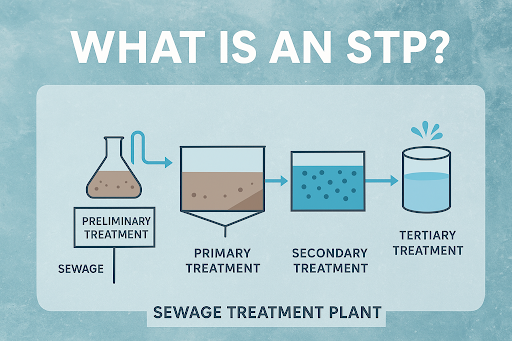What is an STP (Sewage Treatment Plant), How It Works, and Why It’s Important for Housing Societies & Industries in India.
India is a fast-growing country with rising cities, industries, and housing projects. With growth comes a big challenge sewage and wastewater management.
Every day, millions of liters of dirty water are generated from homes, offices, hotels, and factories. If this untreated water is released directly into drains or rivers, it pollutes our environment, spreads diseases, and damages public health.
The Solution: Sewage Treatment Plant (STP)
👉 The solution is a Sewage Treatment Plant (STP). In this blog, we’ll explain:
- What is an STP?
- How does an STP work?
- Why is it important for housing societies and industries?
- Why you should choose the right sewage treatment plant manufacturer and supplier in India.
What is an STP (Sewage Treatment Plant)?
An STP (Sewage Treatment Plant) is a system designed to clean and recycle wastewater.
This wastewater usually comes from:
- Domestic sources – toilets, bathrooms, kitchens in houses and apartments.
- Commercial sources – hotels, hospitals, offices, shopping malls.
- Industrial sources – factories, food processing units, textile units, etc.
Instead of wasting this water, an STP removes harmful pollutants and makes it reusable for:
- Gardening & irrigation
- Toilet flushing
- Cooling towers in industries
- Construction work
In simple words, an STP helps save water, protect the environment, and stay legally compliant.
How Does an STP Work? (Step by Step)
An STP works in four major stages:
1. Preliminary Treatment
- Wastewater passes through screens to remove large objects (plastic, cloth, wood pieces).
- A grit chamber removes sand, stones, and small particles.
2. Primary Treatment
- Water is stored in settling tanks where heavy solids settle at the bottom and oils/grease float at the top.
- Sludge is collected separately for further treatment.
3. Secondary (Biological) Treatment
- Microorganisms (bacteria) are used to eat and break down organic matter.
- Common processes: MBBR (Moving Bed Biofilm Reactor), SBR (Sequencing Batch Reactor), MBR (Membrane Bioreactor).
- These technologies ensure up to 90–95% wastewater treatment.
4. Tertiary Treatment
- Water is disinfected using chlorination, UV, or filtration.
- Final water is clear, odor-free, and reusable.
By the end, sewage water becomes safe for reuse and doesn’t harm the environment.
Why is STP Important in India?
1. Legal Requirement
- The Pollution Control Board (PCB) makes it mandatory for housing societies, industries, and commercial projects to install STPs.
- Non-compliance can lead to heavy fines, legal action, or cancellation of project approvals.
2. Water Scarcity
Cities like Delhi, Mumbai, Bangalore, Chennai face major water shortages. An STP reduces dependency on freshwater supply.
3. Environmental Protection
- Prevents dirty sewage from entering rivers and lakes.
- Reduces waterborne diseases.
- Protects aquatic life.
4. Cost Savings
- Reusing treated water for flushing, gardening, and cooling reduces water bills.
- Saves lakhs of rupees every year for housing societies and industries.
5. Better Living Standards
- No foul smell or dirty surroundings.
- Cleaner and healthier lifestyle.
Importance of STPs for Housing Societies
- Societies with more than 20 flats are required to install an STP.
- Recycled water can be reused for flushing and gardening → lowers water bills.
- Ensures RERA & PCB compliance, protecting builders and residents from penalties.
Importance of STPs for Industries
Industries generate large amounts of wastewater containing harmful chemicals. STPs treat industrial sewage before disposal.
- - Prevents industries from getting pollution-related notices or shutdown orders.
- - Ensures CSR & environmental compliance.
-Industries that require STPs include:
- - Textiles & Garments
- - Food & Beverages
- - Pharmaceuticals
- - Chemicals
- - IT Parks & SEZs
Role of a Sewage Treatment Plant Manufacturer and Supplier
Choosing the right sewage treatment plant manufacturer and supplier is critical. A professional STP manufacturer provides:
- Customized Design – Capacity as per your housing society, industry, or commercial project.
- Advanced Technology – Latest systems like MBBR, SBR, or MBR for higher efficiency.
- Government Compliance – Ensures PCB & CPCB guidelines are followed.
- Installation & Commissioning – End-to-end support from design to execution.
- Operation & Maintenance (O&M) – Regular servicing to ensure smooth performance.
At Chhaya Industries, we are a trusted sewage treatment plant manufacturer and supplier in India, offering solutions for residential, commercial, and industrial projects.
Benefits of Choosing the Right STP Manufacturer
- - Long life & durability of the plant
- - Low energy consumption
- - Easy operation & maintenance
- - Timely installation
- - Cost-effective solutions
Conclusion
A Sewage Treatment Plant (STP) is not just a legal requirement but also a smart investment for housing societies, industries, and commercial projects in India.
It helps in:
- - Saving freshwater resources
- - Meeting government compliance
- - Protecting the environment
- - Reducing operational costs
If you are searching for a reliable sewage treatment plant manufacturer and supplier in India,
Chhaya Industries is here to help with expert design, installation, and maintenance services.
FAQs on STPs in India
Q1: Is it compulsory for housing societies to install an STP?
Yes, as per Pollution Control Board guidelines, societies with more than 20 flats must have an STP.
Q2: Can treated water be used for drinking?
No. Treated water can be used for flushing, gardening, cooling towers, and construction, but not for drinking.
Q3: How much space does an STP need?
Space depends on society size or industry load. Small compact STPs are also available for space-limited projects.
Q4: What is the cost of an STP in India?
Cost depends on capacity, technology, and location. On average, small housing societies may spend ₹5–10 lakhs, while industries may require bigger investments.
Q5: How do I choose the best sewage treatment plant manufacturer and supplier?
Look for experience, compliance record, after-sales service, and successful projects across India.

